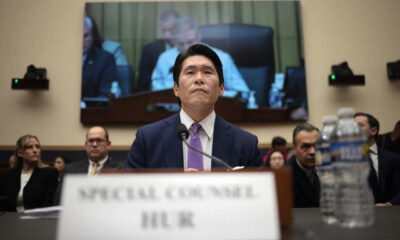Tigran Gambaryan, a former US federal agent and American citizen, has been held hostage in Nigeria for over 80 days now, sparking significant concern and outrage. Gambaryan, who now serves as an executive at Binance—the world’s largest cryptocurrency exchange—was in Nigeria for a business meeting by invitation of the Nigerian government when he was unexpectedly arrested by Nigerian officials, and is now being held hostage. Officials are demanding that Binance pay a ransom of $150 million, and has already been transfered to a notorious prison, known for housing some of the country’s most dangerous criminals, increasing the need for urgency on behalf of the White House.
“Tigran’s case is a gut-wrenching example of how easily the Biden Administration gets pushed around on the international stage. Here we have an American and former federal law enforcement officer being unjustly held by Nigeria (supposedly an ally), used as a pawn in an economic dispute with a private company, and the Administration seems to be sitting idly by and not doing anything to help bring him home to Georgia. Let’s be clear, President Trump does not let anyone bully America, especially a country that gets a substantial amount of foreign aid from the US taxpayer, and President Biden should follow suit.”
— Congressman Rich McCormick of GA-6, and is Tigran’s representative in Congress.
The statement made directly to Leading Report from the Congressman’s office.
Despite the alarming nature of Gambaryan’s detention and the potential risks to his safety, the Biden administration has yet to act on the situation, acknowledging the issue at hand, but refusing action to date. This silence has been met with growing frustration from Gambaryan’s family, friends, and colleagues, who are calling for a more proactive response from the US government.
A State Department spokesperson has responded, alleging they are monitoring the situation, but have yet to make an attempt to help Mr. Gambaryan.
The situation remains dire, and the urgency for intervention increases with each passing day. Gambaryan’s family has released a video he recorded just before his phone was confiscated by Nigerian authorities, highlighting his concern for his safety and pleading for immediate assistance. This poignant appeal underscores the critical need for action and has intensified calls for the Biden administration to break its silence and take decisive measures to secure Gambaryan’s freedom.
Despite Nigeria ranking #6 for the most U.S. foreign aid, its government has still detained an American citizen, Tigran Gambaryan, a former federal agent and current Binance executive, demanding a ransom for his release. This incident underscores a troubling disconnect, as significant financial aid appears to have little influence on ensuring the safety of U.S. citizens abroad. The Biden administration’s lack of response to Gambaryan’s detention has sparked outrage and concern, raising questions about the effectiveness of U.S. foreign aid and the administration’s commitment to protecting its citizens in hostile environments. The silence from the White House only intensifies the urgency for action, as Gambaryan’s fate hangs in the balance.
While the Nigerian foreign minister is in the US promoting the close relationship between the two countries, questions arise about whether the Biden administration will take any action, such as detaining the minister, to secure Tigran Gambaryan’s release.
MSNBC’s Morning Joe had the Nigerian Foreign Minister on for an interview, and somehow one of the biggest conflicts related to the relationship between the U.S. and Nigeria was not even brought up, with no mention of Tigran.
As the international community watches closely, the pressure mounts on the US government to address this crisis and demonstrate its dedication to safeguarding its citizens, regardless of where they are in the world.
SOURCES: THE HILL, LEADING REPORT



































You must be logged in to post a comment Login